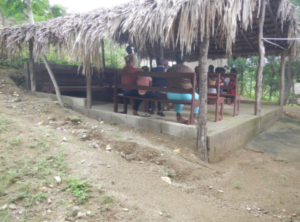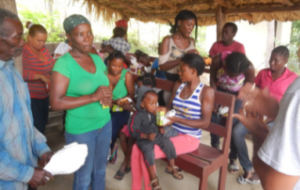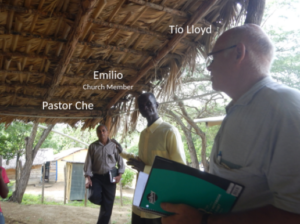“Each morning I look for my father, but he is already gone to work in the fields. I see all the other children in uniform walking to school but I can not go. Most days I wish I could go to school and be fed a hot lunch like all the other kids. All day there is no one for me to play with except my brothers and sisters and I get bored and start fights. In the afternoon, I see the children return and play games, but I can’t play because I can’t talk to them. When I do get to play baseball I get into trouble because I do not know how to be with other children.”
This young boy’s story is a common one for Haitian children living in the Dominican Republic. There are approximately 100,000-300,000 Haitians living in the Dominican Republic – many are undocumented immigrants without birth certificates or papers of any kind. Many Haitians find work in agriculture for Dominican farmers or in construction, digging foundations by hand. They are typically transitory – moving where they feel safe and where there is work.
Without papers Haitian children in the Dominican cannot attend school. Paperwork can be obtained but an individual requires five witnesses and the government is currently experiencing a huge backlog. There are also a number of Dominican without papers because some parents cannot afford the cost of registering the birth.



Barb and Lloyd Peterson have been involved in ministry the Dominican for over thirty years. They have taught, preached and mentored in many different communities. And they have developed deep, trusted relationships. During the Peterson’s las visit, Bishop Cecilio Cecilio O’Soria of the Free Methodist church in the Dominican said, “The Petersons go back to Canada for vacation. They belong to us.”
When Barb and Lloyd learned how many children were not able to attend school in the community of Baitoa they wanted to help. “We heard that some teachers and schools would allow children without papers to attend. But the best they could do is get grade five because they wouldn’t be allowed to write the national grade six exam. Grade five doesn’t make them very employable and won’t give them a good quality of life.”
The Petersons are working with the community of Baitoa and La Iglesia Metodista Libre de Uberos to create a community centre and co-operative Bible club where children and their mothers can learn to read, write and speak Spanish. “We have found a local person who is willing to instruct and the mothers of the children will help with discipline, cleaning and perhaps serving the snack. The primary textbook will be the Bible.”
They also hope to offer micro-business training. “The income of Haitians is low. During the rainy season there is no construction work. So we want to help them start making things in their homes for additional income and to keep them learning.”
A covered shelter will initially serve as the community centre but the dream is to eventually build a multi-purpose space of their own which would include a classroom, church and meeting space.
Lloyd and Barb never fly solo! The community of Baitoa is ready and willing and they have the support of the Superintendent and Bishop but the more hands the merrier, “We are always looking for people to help us. We will need some financial and human resources from Canada.
They hope to have the co-operative up and running by this September. If you would like to support this project financially you can send a cheque to Open Arms FMC in Tillsonburg, ON. Just write Dominican/Haitian project on it and the funds will be directed to the project. If you would like to speak with Barb and Lloyd about skills and gifts you could contribute to the project please email them at petersonb498@gmail.com.



